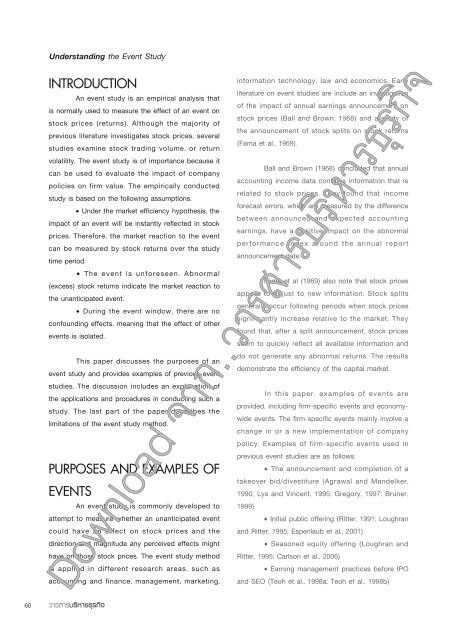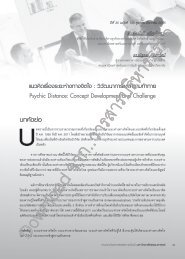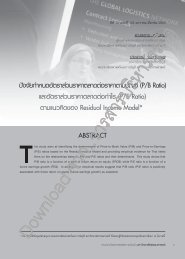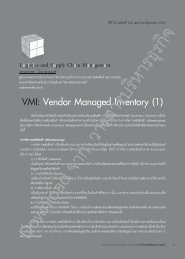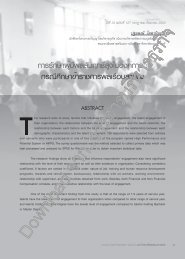Understanding the Event Study - Journal of Business Administration
Understanding the Event Study - Journal of Business Administration
Understanding the Event Study - Journal of Business Administration
Create successful ePaper yourself
Turn your PDF publications into a flip-book with our unique Google optimized e-Paper software.
60<br />
<strong>Understanding</strong> <strong>the</strong> <strong>Event</strong> <strong>Study</strong><br />
INTRODUCTION<br />
An event study is an empirical analysis that<br />
is normally used to measure <strong>the</strong> effect <strong>of</strong> an event on<br />
stock prices (returns). Although <strong>the</strong> majority <strong>of</strong><br />
previous literature investigates stock prices, several<br />
studies examine stock trading volume, or return<br />
volatility. The event study is <strong>of</strong> importance because it<br />
can be used to evaluate <strong>the</strong> impact <strong>of</strong> company<br />
policies on firm value. The empirically conducted<br />
study is based on <strong>the</strong> following assumptions.<br />
• Under <strong>the</strong> market efficiency hypo<strong>the</strong>sis, <strong>the</strong><br />
impact <strong>of</strong> an event will be instantly reflected in stock<br />
prices. Therefore, <strong>the</strong> market reaction to <strong>the</strong> event<br />
can be measured by stock returns over <strong>the</strong> study<br />
time period. <br />
• The event is unforeseen. Abnormal<br />
(excess) stock returns indicate <strong>the</strong> market reaction to<br />
<strong>the</strong> unanticipated event.<br />
• During <strong>the</strong> event window, <strong>the</strong>re are no<br />
confounding effects, meaning that <strong>the</strong> effect <strong>of</strong> o<strong>the</strong>r<br />
events is isolated. <br />
<br />
This paper discusses <strong>the</strong> purposes <strong>of</strong> an<br />
event study and provides examples <strong>of</strong> previous event<br />
studies. The discussion includes an explanation <strong>of</strong><br />
<strong>the</strong> applications and procedures in conducting such a<br />
study. The last part <strong>of</strong> <strong>the</strong> paper describes <strong>the</strong><br />
limitations <strong>of</strong> <strong>the</strong> event study method.<br />
<br />
<br />
PURPOSES AND EXAMPLES OF<br />
EVENTS<br />
An event study is commonly developed to<br />
attempt to measure whe<strong>the</strong>r an unanticipated event<br />
could have an effect on stock prices and <strong>the</strong><br />
direction and magnitude any perceived effects might<br />
have on those stock prices. The event study method<br />
is applied in different research areas, such as<br />
accounting and finance, management, marketing,<br />
วารสารบริหารธุรกิจ<br />
information technology, law and economics. Early<br />
literature on event studies are include an investigation<br />
<strong>of</strong> <strong>the</strong> impact <strong>of</strong> annual earnings announcement on<br />
stock prices (Ball and Brown, 1968) and a study <strong>of</strong><br />
<strong>the</strong> announcement <strong>of</strong> stock splits on stock returns<br />
(Fama et al., 1969). <br />
<br />
Ball and Brown (1968) concluded that annual<br />
accounting income data contains information that is<br />
related to stock prices. They found that income<br />
forecast errors, which are measured by <strong>the</strong> difference<br />
between announced and expected accounting<br />
earnings, have a positive impact on <strong>the</strong> abnormal<br />
performance index around <strong>the</strong> annual report<br />
announcement date. <br />
<br />
Fama et al (1969) also note that stock prices<br />
appear to adjust to new information. Stock splits<br />
generally occur following periods when stock prices<br />
significantly increase relative to <strong>the</strong> market. They<br />
found that, after a split announcement, stock prices<br />
seem to quickly reflect all available information and<br />
do not generate any abnormal returns. The results<br />
demonstrate <strong>the</strong> efficiency <strong>of</strong> <strong>the</strong> capital market.<br />
<br />
In this paper, examples <strong>of</strong> events are<br />
provided, including firm-specific events and economywide<br />
events. The firm-specific events mainly involve a<br />
change in or a new implementation <strong>of</strong> company<br />
policy. Examples <strong>of</strong> firm-specific events used in<br />
previous event studies are as follows. <br />
• The announcement and completion <strong>of</strong> a<br />
takeover bid/divestiture (Agrawal and Mandelker,<br />
1990; Lys and Vincent, 1995; Gregory, 1997; Bruner,<br />
1999)<br />
• Initial public <strong>of</strong>fering (Ritter, 1991; Loughran<br />
and Ritter, 1995; Espenlaub et al., 2001)<br />
• Seasoned equity <strong>of</strong>fering (Loughran and<br />
Ritter, 1995; Carlson et al., 2006)<br />
• Earning management practices before IPO<br />
and SEO (Teoh et al., 1998a; Teoh et al., 1998b)<br />
Download จาก..วารสารบริหารธุรกิจ


